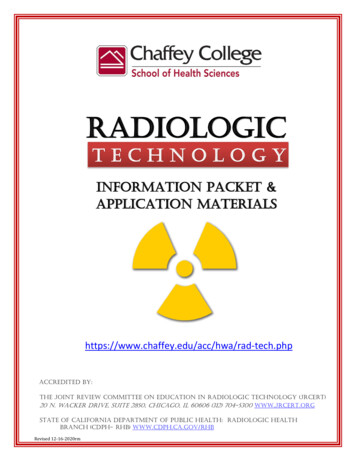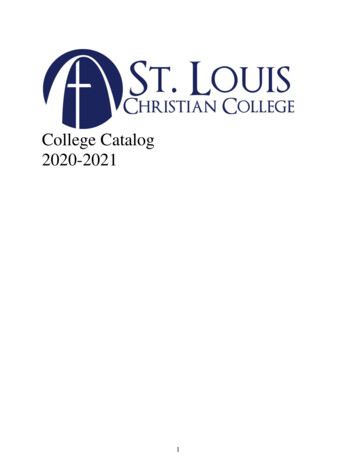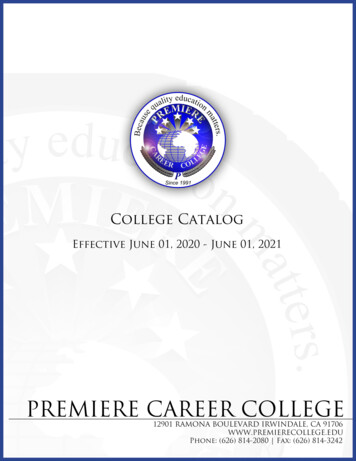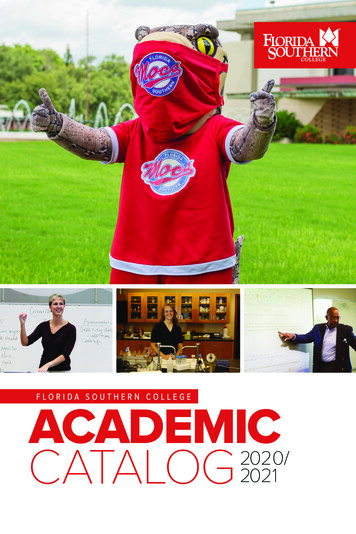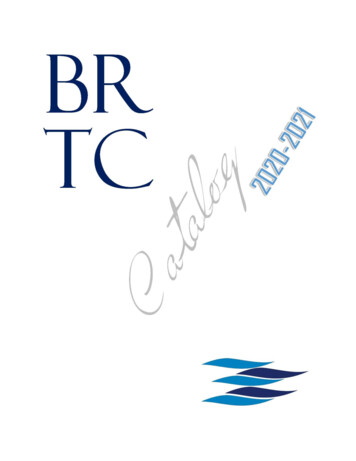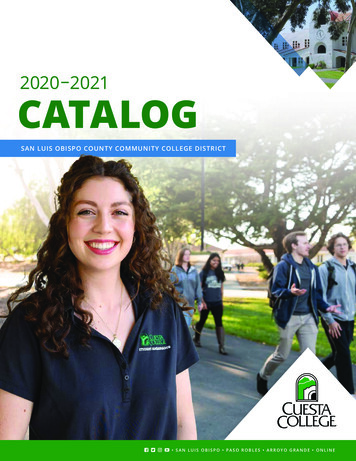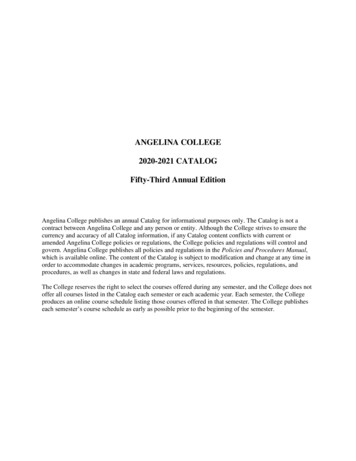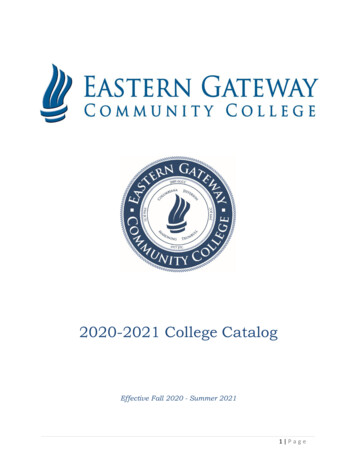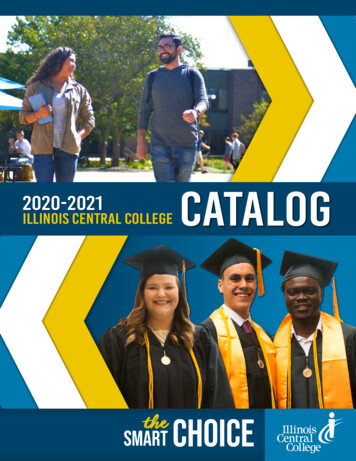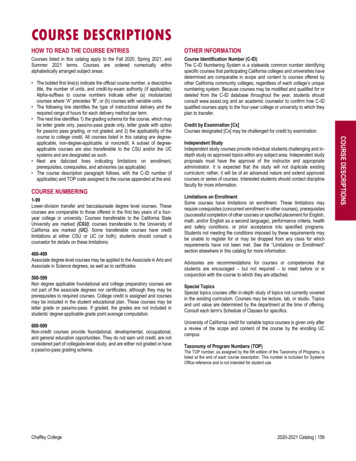
Transcription
COURSE DESCRIPTIONSHOW TO READ THE COURSE ENTRIESOTHER INFORMATIONCourses listed in this catalog apply to the Fall 2020, Spring 2021, andSummer 2021 terms. Courses are ordered numerically withinalphabetically arranged subject areas.Course Identification Number (C-ID)The C-ID Numbering System is a statewide common number identifyingspecific courses that participating California colleges and universities havedetermined are comparable in scope and content to courses offered byother California community colleges, regardless of each college’s uniquenumbering system. Because courses may be modified and qualified for ordeleted from the C-ID database throughout the year, students shouldconsult www.assist.org and an academic counselor to confirm how C-IDqualified courses apply to the four-year college or university to which theyplan to transfer.COURSE NUMBERING1-99Lower-division transfer and baccalaureate degree level courses. Thesecourses are comparable to those offered in the first two years of a fouryear college or university. Courses transferable to the California StateUniversity are marked (CSU); courses transferable to the University ofCalifornia are marked (UC). Some transferable courses have creditlimitations at either CSU or UC (or both); students should consult acounselor for details on these limitations.400-499Associate degree level courses may be applied to the Associate in Arts andAssociate in Science degrees, as well as to certificates.500-599Non degree applicable foundational and college preparatory courses arenot part of the associate degrees nor certificates, although they may beprerequisites to required courses. College credit is assigned and coursesmay be included in the student educational plan. These courses may beletter grade or pass/no-pass. If graded, the grades are not included instudents’ degree applicable grade point average computation.600-699Non-credit courses provide foundational, developmental, occupational,and general education opportunities. They do not earn unit credit, are notconsidered part of collegiate-level study, and are either not graded or havea pass/no-pass grading schema.Chaffey CollegeCredit by Examination [Cx]Courses designated [Cx] may be challenged for credit by examination.Independent StudyIndependent study courses provide individual students challenging and indepth study on approved topics within any subject area. Independent studyproposals must have the approval of the instructor and appropriateadministrator. It is expected that the study will not duplicate existingcurriculum; rather, it will be of an advanced nature and extend approvedcourses or series of courses. Interested students should contact disciplinefaculty for more information.Limitations on EnrollmentSome courses have limitations on enrollment. These limitations mayrequire corequisites (concurrent enrollment in other courses), prerequisites(successful completion of other courses or specified placement for English,math, and/or English as a second language), performance criteria, healthand safety conditions, or prior acceptance into specified programs.Students not meeting the conditions imposed by these requirements maybe unable to register for or may be dropped from any class for whichrequirements have not been met. See the “Limitations on Enrollment”section elsewhere in this catalog for more information.Advisories are recommendations for courses or competencies thatstudents are encouraged – but not required – to meet before or inconjunction with the course to which they are attached.Special TopicsSpecial topics courses offer in-depth study of topics not currently coveredin the existing curriculum. Courses may be lecture, lab, or studio. Topicsand unit value are determined by the department at the time of offering.Consult each term’s Schedule of Classes for specifics.University of California credit for variable topics courses is given only aftera review of the scope and content of the course by the enrolling UCcampus.Taxonomy of Program Numbers (TOP)The TOP number, as assigned by the 6th edition of the Taxonomy of Programs, islisted at the end of each course description. This number is included for SystemsOffice reference and is not intended for student use2020-2021 Catalog 159COURSE DESCRIPTIONS The bolded first line(s) indicate the official course number, a descriptivetitle, the number of units, and credit-by-exam authority (if applicable).Alpha-suffixes to course numbers indicate either (a) modularizedcourses where “A” precedes “B”, or (b) courses with variable units. The following line identifies the type of instructional delivery and therequired range of hours for each delivery method per term. The next line identifies 1) the grading schema for the course, which maybe letter grade only, pass/no-pass grade only, letter grade with optionfor pass/no pass grading, or not graded, and 2) the applicability of thecourse to college credit. All courses listed in this catalog are degreeapplicable, non-degree-applicable, or noncredit. A subset of degreeapplicable courses are also transferable to the CSU and/or the UCsystems and are designated as such. Next are italicized lines indicating limitations on enrollment,prerequisites, corequisites, and advisories (as applicable). The course description paragraph follows, with the C-ID number (ifapplicable) and TOP code assigned to the course appended at the end.
ACCOUNTING (ACCTG)COURSE DESCRIPTIONSACCTG-1A Financial Accounting (4)Lecture 64 - 72 hours.Grading: Letter Grade(CSU; UC)Advisory: CIS-1 Introduction to Computer Information Systems orBUSTEC-63 Microsoft Office Excel - ComprehensiveDevelopment and communication of financial information that is useful toinvestors, creditors, and others to make decisions. Course material coveredincludes the accounting environment, accounting cycle, application ofgenerally accepted accounting principles, ethics, financial statements,operating, investing, and financing activities.C-ID ACCT 1100502.00ACCTG-1B Managerial Accounting (4)Lecture 64 - 72 hours.Grading: Letter Grade(CSU; UC)Advisory: CIS-1 Introduction to Computer Information Systems orexperience using spreadsheetsPrerequisite: ACCTG-1A Financial AccountingManagerial accounting meets the information needs of internal users bydeveloping and communicating information that is useful for managementdecision-making. Course material covered includes cost terms andconcepts, cost behavior, cost control, cost-volume-profit analysis, profitplanning and performance analysis in manufacturing & serviceenvironments.C-ID ACCT 1200502.00ACCTG-70 Cost Accounting (3)Lecture 48 - 54 hours.Grading: Letter Grade(CSU)Prerequisite: ACCTG-1B Managerial AccountingFundamentals of cost accounting including theoretical concepts,terminology, planning, controlling, and costing for products, services, andcustomers. Using cost accounting theoretical concepts, students willperform comparative analyses related to product costing formanufacturing, merchandising, and service companies. Students will alsoevaluate both quantitative and qualitative data to assist management withstrategic decision-making, planning, and control.0502.00ACCTG-430 Accounting for Governmental and Not-for-ProfitOrganizations (4)Lecture 64 - 72 hours.Grading: Letter Grade(Degree-applicable)Prerequisite: ACCTG-1A Financial AccountingIntroduction to the fundamentals of governmental and not-for-profitaccounting. Emphasis on accounting for the various fund types andrestrictions relevant to government and not-for-profit agencies, exploringboth theoretical and practical aspects.0502.00ACCTG-435 Payroll Accounting (3)Lecture 48 - 54 hours.Grading: Letter Grade(Degree-applicable)Advisory: ACCTG-1A Financial Accounting, ACCTG-480 AppliedAccounting I, or ACCTG-481 Applied Accounting IIComprehensive overview of federal and state payroll laws and their effect onpayroll records and required government reports. Course may be taken everythree years as needed to maintain currency with payroll laws.0502.00ACCTG-460 Commercial Accounting Software (3)Lecture 48 - 54 hours.Grading: Letter Grade(Degree-applicable)Advisory: ACCTG-1A Financial Accounting and CIS-1 Introduction toComputer Information SystemsBasic concepts and techniques for using commercial accounting softwaredesigned for microcomputers in businesses grossing less than 500,000annually. How to enter and process data, create reports and interpret theinformation.0502.00160 2020-2021 CatalogACCTG-480 Applied Accounting I (3) [Cx]Lecture 48 - 54 hours.Grading: Letter Grade(Degree-applicable)Introduction to the bookkeeping of a small business, with emphasis onservice-oriented sole proprietorships. Skills and tasks covered includejournalizing business transactions, maintaining a general ledger system, andpreparing and analyzing financial statements. Course is suitable preparationfor individuals performing accounting for small businesses.0502.00ACCTG-481 Applied Accounting II (3)Lecture 48 - 54 hours.Grading: Letter Grade(Degree-applicable)Prerequisite: ACCTG-480 Applied Accounting IContinuation of bookkeeping for a small service business, with anintroduction to bookkeeping for a merchandising enterprise and accountingfor partnerships and corporations. Course culminates in a comprehensivereview of full-charge bookkeeping practices, and is suitable preparation forthe Certified Bookkeeper exam, and for persons involved with or interestedin small business accounting.0502.00ACCOUNTING AND FINANCIALSERVICES (ACCTGFS)ACCTGFS-30 Personal Finance (3)Lecture 48 - 54 hours.Grading: Letter Grade(CSU; UC)Fundamentals of personal finance including financial planning, moneymanagement, income and asset protection, and investments. Coursematerial covered includes calculations and problem solving related tobudgeting, managing income taxes, building and maintaining good credit,large personal assets purchases, managing property and liability risk,investment fundamentals, and retirement and estate planning. 0505.00ACCTGFS-442 Fundamentals of Finance and Investing (3)Lecture 48 - 54 hours.Grading: Letter Grade(Degree-applicable)Introduction to finance theory and its application to investment decisionsinvolving stocks, bonds, mutual funds, government securities, options, andreal estate. Topics include asset allocation principles, modern portfoliotheory, investment tools and strategies, diversification, and tax implicationsof investments.0504.00ACCTGFS-453 U.S. and California Income Tax Preparation (4)Lecture 64 - 72 hours.Grading: Letter Grade(Degree-applicable)U.S. and California income tax principles and tax return preparation as itrelates to individuals, sole proprietorships, and other business entities. Thiscourse is certified by the California Tax Education Council as fulfilling the60-hour qualifying education requirement imposed by the State ofCalifornia for becoming a Registered Tax Preparer.0502.10ACCTGFS-465 Financial Accounting for the Non-Accounting Major (3)Lecture 48 - 54 hours.Grading: Letter Grade(Degree-applicable)Creation, use, and interpretation of accounting data by the non-accountingbusiness major, from an entrepreneurial perspective. Topics include:business structure and financial statement analyses; forecasted financialstatements; cash management and budgeting, including capital andoperating budgets; management of receivables and payables; and anoverview of financing options, banking relations, and credit management.0502.00Chaffey College
AMERICAN SIGN LANGUAGE (ASL)ANTHROPOLOGY (ANTHRO)ASL-1 Elementary American Sign Language I (4)Lecture 64 - 72 hours.Grading: Letter Grade(CSU; UC)Study of American Sign Language (ASL), including an introduction tocurrent and historical aspects of deaf culture. Skills focus on the basicprinciples of phrasing, vocabulary, sentence patterns, manual counting andspelling, semantics, and the development of expressive and receptiveabilities. This course may also require completion of supplementalassignments. This course corresponds to the first year of high school ASL.0850.00ANTHRO-1 Introduction to Biological Anthropology (3)Lecture 48 - 54 hours.Grading: Letter Grade(CSU; UC)Advisory: Eligibility for ENGL-1A as determined by the Chaffey Collegeplacement processThis course introduces the concepts, methods of inquiry, and scientificexplanations for biological evolution and their application to the humanspecies. Issues and topics will include, but are not limited to, genetics,evolutionary theory, human variation and biocultural adaptations,comparative primate anatomy and behavior, and the fossil evidence forhuman evolution. The scientific method serves as foundation of the course.C-ID ANTH 1102202.00ASL-3 Intermediate American Sign Language III (4)Lecture 64 - 72 hours.Grading: Letter Grade(CSU; UC)Prerequisite: ASL-2 Elementary American Sign Language IIContinued study and review of the structure, vocabulary, andconversational strategies of American Sign Language (ASL). Review ofASL grammar, with special emphasis on idiomatic constructions.Continued study of the American Deaf culture, history, community, andlanguage; thereby promoting an understanding of the wide variety ofcultural issues concerning the Deaf community. This course may alsorequire completion of supplemental assignments.0850.00ASL-4 Intermediate American Sign Language IV (4)Lecture 64 - 72 hours.Grading: Letter Grade(CSU; UC)Prerequisite: ASL-3 Intermediate American Sign Language IIIContinued study and review of the structure, vocabulary, grammar, andconversational strategies of American Sign Language (ASL). Furtherdevelopment and refinement of ASL fluency in both productive andreceptive skills, including mastery of ASL sentence structures.Appreciation and application of Deaf cultural norms, values, and behaviors.This course may also require completion of supplemental assignments.0850.00ASL-18 Introduction to Deaf Studies (3)Lecture 48 - 54 hours.Grading: Letter Grade(CSU; UC)Prerequisite: ASL-1 Elementary American Sign Language IOverview of Deaf history and the origins of American Sign Language.Introduction to the basic issues of Deaf culture and communication.Students will gain an overview of historical and contemporary issues andpeople in the Deaf community. This course introduces students to the widevariety of issues involved in Deaf Studies, including linguistics, education,sociology, psychology, and interpreting.0850.00Chaffey CollegeANTHRO-1L Laboratory for Biological Anthropology (1)Laboratory 48 - 54 hours.Grading: Letter Grade(CSU; UC)Corequisite: ANTHRO-1 Introduction to Biological Anthropology (may betaken previously)Optional laboratory experience coordinated with Anthropology 1.Comparative study of both human and non-human primates, humanvariation, evolution, genetics, forensic anthropology, and the primate fossilrecord.C-ID ANTH 115 L2202.00ANTHRO-2 Introduction to Archaeology (3)Lecture 48 - 54 hours.Grading: Letter Grade(CSU; UC)Other: Eligibility for ENGL-1A as determined by the Chaffey Collegeplacement process.This course is an introduction to the study of concepts, theories, data andmodels of anthropological archaeology that contribute to our knowledge ofthe human past. The course includes a discussion of the nature of scientificinquiry; the history and interdisciplinary nature of archaeological research;dating techniques; methods of survey, excavation, analysis, andinterpretation; cultural resource management; professional ethics; andselected cultural sequences.C-ID ANTH 1502202.00ANTHRO-3 Introduction to Social and Cultural Anthropology (3)Lecture 48 - 54 hours.Grading: Letter Grade(CSU; UC)Other: Eligibility for ENGL-1A as determined by the Chaffey Collegeplacement process.This course explores how anthropologists study and compare humanculture. Cultural anthropologists seek to understand the broad arc ofhuman experience focusing on a set of central issues: how people aroundthe world make their living (subsistence patterns); how they organizethemselves socially, politically and economically; how they communicate;how they relate to each other through family and kinship ties; what theybelieve about the world (belief systems); how they express themselvescreatively (expressive culture); how they make distinctions amongthemselves such as through applying gender, racial and ethnic identitylabels; how they have shaped and been shaped by social inequalities suchas colonialism; and how they navigate culture change and processes ofglobalization that affect us all. Ethnographic case studies highlight thesesimilarities and differences, and introduce students to how anthropologistsdo their work, employ professional anthropological research ethics andapply their perspectives and skills to understand humans around the globe.May be offered as an Honors course.C-ID ANTH 1202202.002020-2021 Catalog 161COURSE DESCRIPTIONSASL-2 Elementary American Sign Language II (4)Lecture 64 - 72 hours.Grading: Letter Grade(CSU; UC)Prerequisite: ASL-1 Elementary American Sign Language I or one year ofhigh school American Sign LanguageContinued systematic study of the structure, vocabulary, andconversational strategies of American Sign Language (ASL). Skills focuson the basic principles of phrasing, sentence patterns, manual countingand spelling, semantics, and the development of expressive and receptiveabilities. Continued study of the American Deaf Culture history, communityand language. This course may also require completion of supplementalassignments.0850.00
COURSE DESCRIPTIONSARABIC (ARABIC)ART (ART)ARABIC-1 Elementary Modern Standard Arabic I (4)Lecture 64 - 72 hours.Grading: Letter Grade(CSU; UC)Introduction to the four basic language skills in functional modern Arabic aural, oral, reading, and writing. Students learn the basics of Arabic scriptand pronunciation while building a foundational vocabulary. Arabic culturalnorms, values, and customs are explored and serve as a basis foradditional skill-building practice. This course may also require completionof supplemental assignments. Corresponds to the first year of high schoolArabic.1112.00ART-10 Fundamentals of Design in Two Dimensions (4)Lecture 48 - 54 hours. Laboratory 48 - 54 hours.Grading: Letter Grade(CSU; UC)Introduction to the concepts, applications, and historical references related totwo-dimensional art and composition, including the study of the basicprinciples and elements of line, shape, texture, value, color and spatial illusion.Development of a visual vocabulary for creative expression.C-ID ARTS 1001002.00ARABIC-2 Elementary Modern Standard Arabic II (4)Lecture 64 - 72 hours.Grading: Letter Grade(CSU; UC)Prerequisite: ARABIC-1 Elementary Modern Standard Arabic I or one yearof high school ArabicContinued presentation of the four basic language skills in functional modernArabic - aural, oral, reading, and writing. Skills focus on the continuingpractice of Arabic script, correct pronunciation, vocabulary expansion, andapplying the rules of grammar and tense to simple declarative sentences andshort conversations. Arabic cultural norms, values, and customs are exploredand serve as a basis for additional skill-building practice. This course mayalso require completion of supplemental assignments. Corresponds to thesecond year of high school Arabic.1112.00ARABIC-3 Intermediate Modern Standard Arabic (4)Lecture 64 - 72 hours.Grading: Letter Grade(CSU; UC)Prerequisite: ARABIC-2 Elementary Modern Standard Arabic II or twoyears of high school ArabicReview of basic Arabic grammar. Introduction to more complex sentencestructures and verb tenses. Students use Modern Standard Arabic at anintermediate level in speaking, listening, reading, and writing. Includesintermediate uses of Modern Standard Arabic alphabet, conversationstrategies, and cultural interactions. Arabic cultural norms, values, andcustoms are explored and serve as a basis for additional skill-buildingpractice. This course may also require completion of supplementalassignments.11
Advisory: ACCTG-1A Financial Accounting, ACCTG-480 Applied Accounting I, or ACCTG-481 Applied Accounting II Comprehensive overview of federal and state payroll laws and their effect on payroll records and required government reports. Course may be taken every three years
